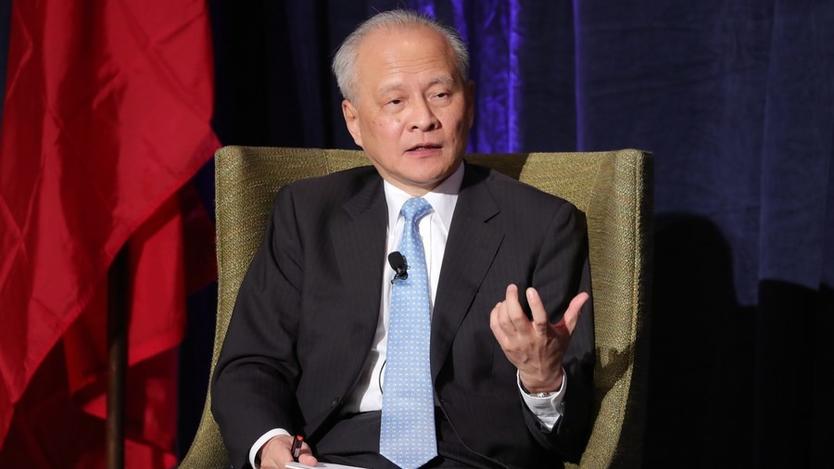 Chinese Ambassador to the United States Cui Tiankai speaks at a dialogue in Grand Rapids, the United States, on Feb 8, 2019. (WANG PING / XINHUA)
Chinese Ambassador to the United States Cui Tiankai speaks at a dialogue in Grand Rapids, the United States, on Feb 8, 2019. (WANG PING / XINHUA)
WASHINGTON - China has never made it a national strategy to replace any other country, and it opposes dividing countries into different camps, Beijing's top envoy in Washington said on Thursday, hours after US President Joe Biden said the East Asian nation aims to be "the most powerful" in the world.
Biden, in his first White House news conference, said China has an "overall goal to become the leading country in the world, the wealthiest country in the world, and the most powerful country in the world".
"Our goal is to meet the growing aspiration of the Chinese people for a better life. Our goal is not to compete with or replace any other country," Chinese Ambassador to the US Cui Tiankai said in a live interview with CNN anchor Christiane Amanpour.
"This is never our national strategy. Hopefully, people could have a better understanding of this," Cui said.
We are certainly living in a very different world, a fast changing world. And there are different systems in the world, different civilizations ... so we believe our future lies in the joint efforts to build such a global community, not to divide the world into different camps.
Cui Tiankai. Chinese Ambassador to the United States
Biden also said that the US is "not looking for confrontation" with China, but there will be "steep competition" and insisted China play by the international rules such as fair competition, and that the US would re-establish its alliances, an effort he said he had told Chinese President Xi Jinping is "not anti-Chinese".
"We believe what today's world wants and what tomorrow's world would want are joint efforts by all countries to build a community of nations for a shared future," Cui said.
Any attempt to divide the world into different camps, or even build confrontational military blocs are not solutions to global challenges, he noted.
The high-level meeting between top Chinese and US diplomats in Anchorage, Alaska last week was a timely one, and it certainly helped both sides have a better understanding of the other, Cui said.
ALSO READ: Cui Tiankai: Cooperation key in virus battle
"I hope this will be the beginning of a long process of dialogue, communication and hopefully coordination between the two sides," he added.
"We are certainly living in a very different world, a fast changing world. And there are different systems in the world, different civilizations," he noted, saying that, "so we believe our future lies in the joint efforts to build such a global community, not to divide the world into different camps."
During the interview, CNN played a story about several children in China's Xinjiang Uygur autonomous region, who were reportedly separated from their families.
READ MORE: Cui: China, US should manage differences in constructive way
"I think it's very unfortunate, it's immoral, to take advantage of any particular family situation and manipulate it," Cui said. "This is not true journalism. It's very unfortunate for CNN."
The ambassador said he had been to Xinjiang more than once in recent years, and "what I saw is a very different story, a very different picture from their reporting".
"I saw a very different picture from some fabrications on the media. Until very recently, the biggest threat to Xinjiang was terrorist attacks," he tweeted later on Thursday. "We do not start wars or use missiles/drones to fight the influence of terrorist and extremist ideology."
Zhao Huanxin contributed to this report


